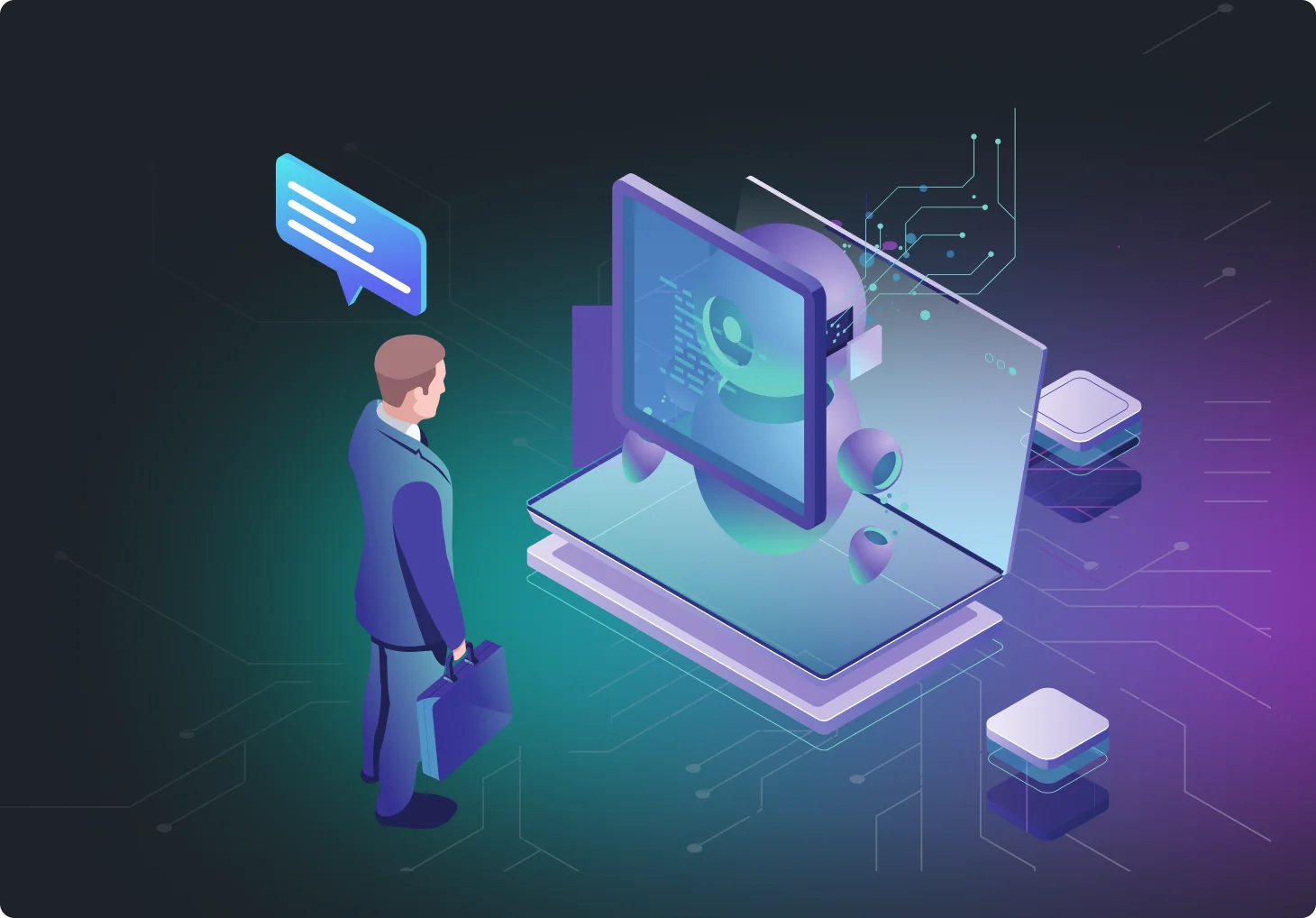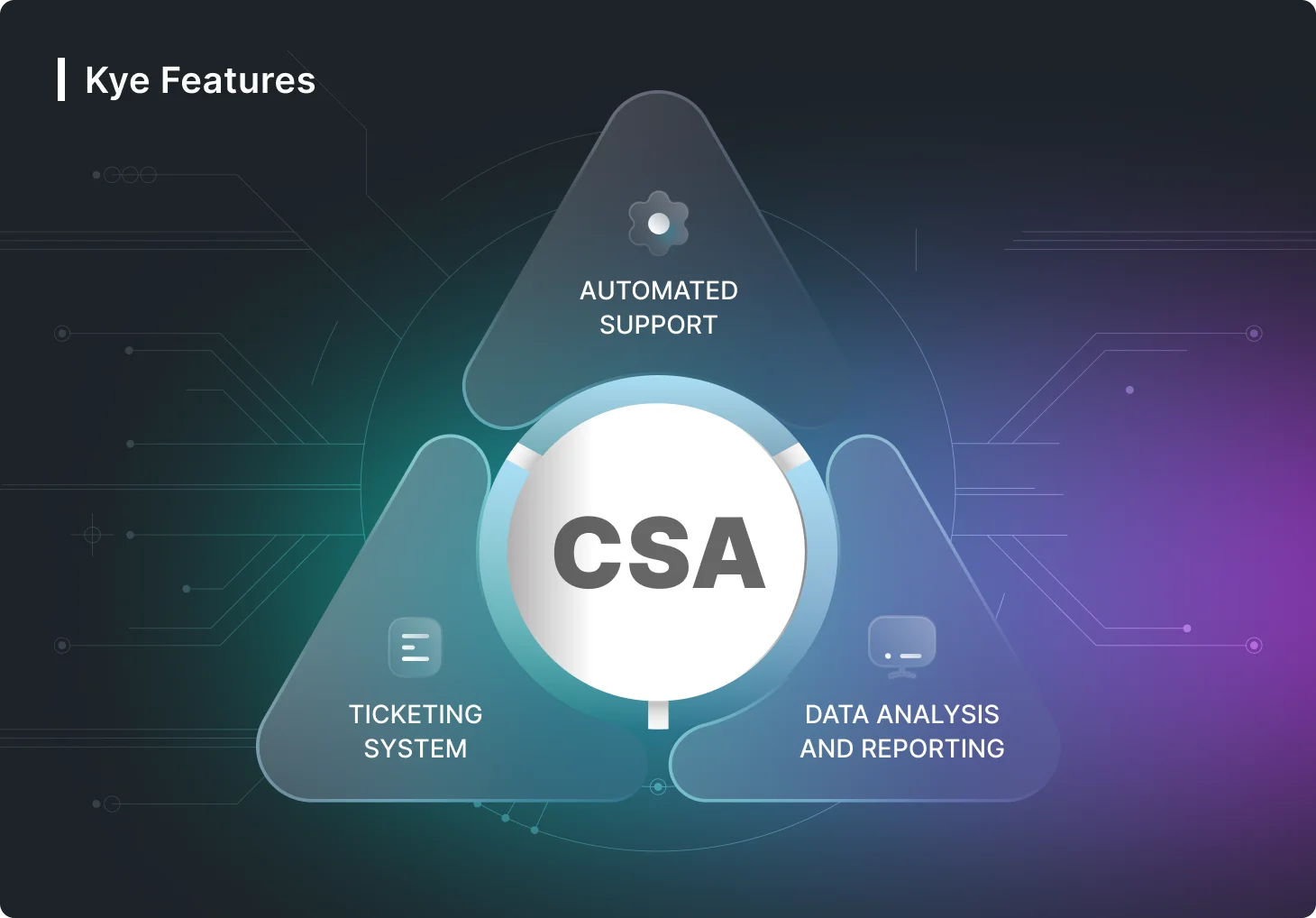The new era of digital technologies brings new possibilities that businesses worldwide could not manage before. The most well-known technology nowadays is Artificial Intelligence. The implementation of this high-tech product amazes, as it can be utilized in various spheres of business processes and niches. The main implementation today is customer service automation.
Herein, we want to describe the essence of this technology, its key features, and different client service solutions. This article will show what is automated customer service and how it can benefit the business. Read to the end, where we will provide insights into how to automate your customer support in just 2 hours.
What is customer service automation
At its core, customer service automation (CSA) employs advanced technologies, predominantly AI-driven, to streamline and enhance consumer interactions. This method aims to facilitate repetitious, routine assignments and free up human agents to concentrate on difficult client service factors that require a more personalized touch.
CSA leverages chatbots, virtual assistants, automated emails, social media monitoring tools, and CRM systems to manage client service tasks. Chatbots respond to simple inquiries, direct consumers to the applicable unit, or even schedule appointments. Similarly, automated emails keep consumers informed about the status of their queries or orders.

Companies of varying sizes and sectors are increasingly integrating CSA into procedures. Amazon, a global e-commerce giant, is a striking example of an organization that uses CSA extensively. Their automated system:
- tracks packages
- answers straightforward delivery queries
- sends emails regarding order status
This automation helps manage the vast volume of consumer interactions and decreases reply time significantly.
Another example is Starbucks, with its mobile application, offering an AI-powered ‘virtual barista.’ This feature allows clients to place orders via voice command or messaging, resulting in a streamlined and efficient ordering process. Automation is a strategic approach businesses adopt to maximize efficiency and remain competitive in a rapidly evolving business environment. As technology advances, its adoption will only increase, reshaping how businesses interact with clients.
Automated customer service is an innovative approach that leverages Artificial Intelligence and various other technological tools to offer streamlined, efficient, and often real-time client support. This innovation does not merely replace human-to-human interaction, but it complements human agents and reduces waiting time. Given this context, we’d like to demonstrate how this technology functions in practice. Recently, we managed the automation of Macpaw’s customer support system by implementing our MetaDialog chatbot into their ecosystem. You can study how we assisted them in this case study.
Key features of customer service automation software
In a continuous pursuit to enhance consumer interactions and loyalty, businesses and organizations are progressively turning to CSA software. This cutting-edge technology brings a suite of tools to enable efficient, streamlined, and personalized responses to clients’ inquiries.
Among the features that make customer service software a compelling choice for organizations are:
- Automated support: AI-based chatbots and virtual assistants interact with clients twenty four hours a day. They handle common questions without the need for human intervention. This offers immediate responses, a feature greatly valued by clients in today’s fast-paced world.
- Ticketing systems: When faced with a client issue that can’t be resolved instantly, the software creates a “ticket”. This ticket acts as a tracker for the issue, making sure it doesn’t get lost in the shuffle and the customer gets a timely and effective resolution.
- Data analysis and reporting: The software has an innate ability to generate an understanding of client behavior, preferences, and satisfaction levels. It does this by automatically collecting and processing client data. These data-driven insights guide the organization’s decision-making process, aiding in refining services and products based on feedback.

By adopting customer support software, businesses are empowered to offer high-quality, personalized service in a scalable and efficient manner. This aids in building stronger consumer relationships and fosters loyalty, which are critical elements in today’s highly competitive business landscape.
Some words about the automated customer service evolution
The concept surfaced in the 1970s with the advent of Interactive Voice Response (IVR) systems. IVRs directed consumers through pre-recorded voice prompts, revolutionizing how businesses addressed incoming rings. Over time, IVRs evolved, employing speech distinction technology to improve client interactions.
However, with the spread of the internet in the late 90s and early 2000s, automation rapidly advanced to include email automation and auto-responders, which grants firms the power to handle clients’ questions swiftly.
With the advent of the digital era and the explosion of social media, customer service automation took another significant leap. AI became the driving force behind innovations such as chatbots, virtual assistants, and auto-responders. Companies started using these tools to deliver real-time, personalized replies to consumer queries, fostering clients’ loyalty.
In the present day, AI-powered client service bots understand natural language, learn from interactions, and provide resolutions to tough issues. The confluence of AI, ML, and NLU is propelling more automated support.
Factors leading to the rise of automation in customer service
Many elements have contributed to the advancement of automation. First, the global shift towards digitalization has seriously impacted this trend. Consumers increasingly prefer online interactions, prompting businesses to adjust and automate services.
Second, the rising hunger for efficiency and cost-effectiveness has also fostered the growth of automation. It made the responses more swift, decreased manpower costs, and boosted productivity.
Third, the need for personalized, round-the-clock support is another driving factor. Automation tools provide customized experiences, and unlike human agents, they are available 24/7, satisfying the necessity of immediacy.
Finally, the pandemic’s onset sped up the move to online ways of connecting. As businesses rushed to keep processes running during lockdowns, robotic help became vital in holding onto client ties.
The future of customer support is undoubtedly rooted in automation. As technologies evolve, businesses will increasingly rely on sophisticated automated client service tools to meet consumer demands and create competitive advantages.
How today’s automation improve customer service
Pondering the question of “How automation helps customer service,” it’s undeniable that automation has revolutionized the client service landscape. With the advancement of technology, businesses are turning to automation to meet this demand, leveraging Artificial Intelligence and various other technological tools to revolutionize their consumer service.
1. Productivity boost
It boosts efficiency and productivity right away by performing regular chores and simple client questions rapidly while leaving more complicated problems to human agents. This prompt remediation of small issues speeds up the general process, cuts down on wait times, and improves the experience. Automated services like chatbots and AI-powered virtual assistants provide round-the-clock help to clients.
2. Enhanced customer insights
Advanced automation technologies are enabling businesses to gain access to client data, allowing them to quickly and accurately make decisions. These insights refine products, personalize marketing efforts, and improve strategies. With better data, businesses make more informed decisions, increasing satisfaction and loyalty.
3. Cost reduction
Investing in automation also leads to considerable cost savings for businesses. Companies have the opportunity to reallocate their human resources to focus on higher-value tasks that require human judgment, creativity, and complex problem-solving. It leads to increased productivity and reduces overhead costs associated with extensive service teams.
4. Scalability
Automation allows businesses to scale client service operations without increasing their staff proportionally. The scalability is especially beneficial during peak demand times, allowing enterprises to maintain high levels of customer help without incurring the high costs of hiring and training additional staff.
5. Competitive advantage
Providing exceptional customer service provides a firm a significant advantage in a market where consumer expectations are always growing. By offering prompt, effective, and individualized support, automation enables businesses to meet and exceed these expectations. This improved quality of client care resulted in higher client satisfaction, loyalty, and advocacy—key factors in company expansion.
In-demand customer service automation solutions
Businesses leverage numerous CSA solutions with all sorts of functions to bolster client support in the digital age. To maximize benefits from automation, it is better to seek help from professionals than independently try to organize processes. MetaDialog suggests not only an AI engine but quick integrations with various tools which the customer can choose. Here are the most demanded solutions:
Zendesk
It is a platform for customer service created to promote consumer interactions. Thanks to its multi-channel support system, businesses may communicate with clients through various channels, including chat, email, phone, and social media. The platform is renowned for its cutting-edge features, simplifying support and improving productivity. These features include AI-powered auto-responses, intelligent ticket routing, and work allocation. Although it provides a wide range of features, the user interface may require some time for novices to get used to. However, its enhanced productivity and customer pleasure often justify the learning curve.
Mailchimp
It is an all-in-one marketing automation platform known for its email marketing capabilities. However, its extensive suite of tools covers much more, helping companies reach clients through various digital channels. This platform enables companies to automate email campaigns, segment their audience, and track performance through advanced analytics. Its scalability makes it an excellent option for companies of all sizes, with pricing tiers that accommodate growing needs. While it doesn’t have the most advanced automation options, its rich feature set and easy-to-use platform make it a compelling option for those needing an integrated marketing tool.
LiveChat
It stands out as a live chat software solution providing real-time customer support. It offers automated greetings, message sneak-peek, and comprehensive chat analytics. The platform stands out with its ability to provide immediate responses, avoiding the delays of email correspondence. LiveChat is user-friendly, with a well-designed interface that simplifies customer service management. Although it lacks the multi-channel support found in some of its competitors, the immediacy it provides is often a valuable trade-off.
Zapier
Zapier is a popular automation tool that helps businesses to facilitate and automate assignments by connecting different apps. It is a bridge, allowing companies to set up “Zaps” or workflows that automate repetitive tasks, saving valuable time. It connects with thousands of apps, making it incredibly adaptable and versatile. However, its power lies in automating multi-step processes across different platforms, a feature not commonly found in other tools.
Start automating your customer support in just 2 hours
The advent of digital technologies, most notably Artificial Intelligence, has transformed client service across various sectors. The technology offers numerous advantages, including 24/7 availability, prompt responses, and personalized service. As technology evolves, companies will rely increasingly on advanced automated customer support tools to stay competitive, as it brings lots of benefits to the business.

Why wait and lose all the possibilities the high-tech technologies bring? We offer you to try the abilities of automation that our AI engine brings right now. MetaDialog’s conversational chatbot automates 87% of customers’ inquiries, and all it takes to make it part of your company’s ecosystem is 2 hours. If you want our team to help your business, then contact us and we will come back to you with ready-made solutions for the different business spheres.
